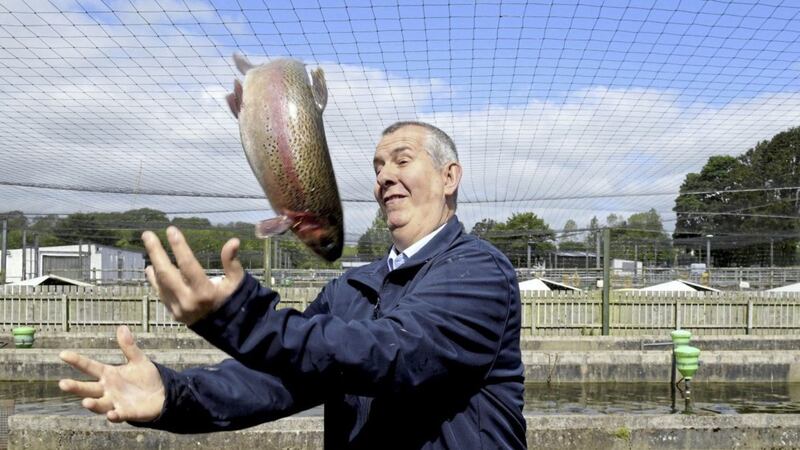DUP agriculture minister Edwin Poots has said Brexit could have advantages for Northern Ireland by granting access to UK and EU markets.
This follows similar comments in February from DUP Commons leader Jeffrey Donaldson.
Portraying Brexit as a 'best of both worlds' for Northern Ireland was a feature of former prime minister Theresa May's deal. Some business leaders even agreed.
The DUP did not agree, leading to Johnson's deal, denounced as "the worst of both worlds" last October by Donaldson's predecessor Nigel Dodds.
The party is clearly performing a screeching U-turn to reframe the debate but could it have a point?
Sea border paperwork would need to be minimal, as Poots conceded, yet the EU is still certain to watch our food exports like a hawk.
We are hardly a convenient location for manufacturing or distribution and the Brexit deal does not cover services, which is where most advantages might lie.
In reality, the best that can be hoped for on the best of both worlds is that the worst of both worlds can be avoided.
**
Brexit is about more than trade and it seems its threat to migrant workers has been avoided.
Following lobbying by the business sector, Northern Ireland is to have its own shortage occupation list in the UK's new points-based immigration system.
This means employers can recruit as many overseas workers as they need at well below the salary threshold applied to immigrants in general. Whether that is a good thing is another question.
The government's Migration Advisory Committee, which is designing the new system, had opposed lower salaries for shortage occupations "as it exempts them from pressure to increase wages, or improve conditions, which could exacerbate any existing shortages".
But that was for the UK as a whole. Perhaps the first question for Northern Ireland is whether people will want to move here after Brexit at any salary.
**
Politicians and writers across Ireland have felt obliged to take a local angle on Downing Street adviser Dominic Cummings and his lockdown travels.
Few have done so with quite the panache of Eamonn McCann.
The former People Before Profit MLA tweeted: "I've just been out for a postprandial dander around the Bogside and a lot of people were saying that the Cummings affair has severely tested their trust in the integrity of the State."
Hopefully, trust in the UK's integrity among people in the Bogside will soon return to normal levels.
**
Political and social arguments over reopening schools have so far been averted in Northern Ireland due to our unusually long summer holidays, as there has never been any question of classes restarting before July.
However, a chicken and egg situation is emerging as principals call in teaching and non-teaching staff to prepare lessons and new social distancing measures for September.
Many are having to turn the work down, despite badly needing it in the case of non-permanent staff, because they have to look after their own children due to school closures.
This is a foretaste of a much larger problem. Restarting the economy is going to be like buying a tin-opener in a tin.
**
TUV leader Jim Allister is bringing a private member's bill to put a new code for special advisers into law, rather than just civil service guidance, as the DUP and Sinn Féin agreed under the New Decade, New Approach deal.
Allister is right to suspect a meaningless stitch-up but his alternative is unwittingly worse. It would create new criminal offences, punishable by lengthy jail terms, for ministers, civil servants or special advisers to communicate using personal email accounts or pass information directly or indirectly to any person or "legal entity" for "any financial or other benefit".
Testifying to a Stormont committee, the Human Rights Commission pointed out this would criminalise whistle-blowing.
It would be ironic if that was the only consequence of RHI.
**
When the government spends extra money in England, the devolved regions get an equivalent amount, known as a Barnett consequential.
At the budget debate this week, the SDLP complained a £95 million transport consequential was being "held centrally" by Sinn Féin finance minister Conor Murphy, instead of being automatically spent on transport here - although that is not how the budget or indeed devolution are meant to work
Expect to hear more of this complaint. Because the focus of extra spending in England tends to be on infrastructure and that is the SDLP's only Stormont department, it cannot help feeling everyone else is getting its money.
**
Sinn Féin president Mary Lou McDonald has been ridiculed for saying "there'd be every chance, every possibility" she would have joined the IRA during the Troubles had she been old enough.
McDonald joined Fianna Fáil in 1999, aged 30.
Sinn Féin Donegal TD Pearse Doherty attempted a more nuanced answer to the same question several days later, saying he did not know what he would have done but he hoped he would have had "the courage".
Was that not calling Gerry Adams a coward?









